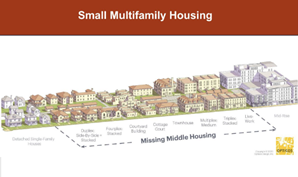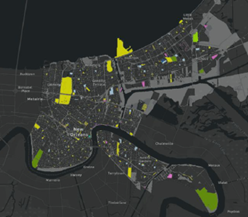Housing Policy Roundtables
 In the Convening & Coordination role, OCAI sets the table, bringing together key people to align, vision and explore the needs of the community in the areas of housing, land use and equitable neighborhood investments.
In the Convening & Coordination role, OCAI sets the table, bringing together key people to align, vision and explore the needs of the community in the areas of housing, land use and equitable neighborhood investments.
Context
Policy changes are badly needed to address housing affordability and housing habitability issues, and the City did not have a regular forum where these issues could be discussed among public agencies and private stakeholders.
Approach
OCAI organizes policy roundtables to convene relevant stakeholders in the public, private, and non-profit development community to brainstorm solutions to ongoing challenges we face in New Orleans.
Result
The City approved changes to the zoning code that legalized small multifamily affordable developments in more parts of the city. Additionally, convenings have led to policy development and initiatives to address the need for housing subsidies that support small landlords in addressing housing quality issues and deferred maintenance.
Strategies for diverse housing opportunity
 In the Policy Guidance & Design role, OCAI serves as an internal resource to government agencies and policymakers, identifying and recommending shifts in policy to preserve affordable housing, update outdated land use practices, and facilitate the development of thriving neighborhoods.
In the Policy Guidance & Design role, OCAI serves as an internal resource to government agencies and policymakers, identifying and recommending shifts in policy to preserve affordable housing, update outdated land use practices, and facilitate the development of thriving neighborhoods.
Context
Historically, New Orleans’ housing stock was as diverse as its residents. Multifamily zoning was gradually peeled away and has limited housing choices for renters and wealth building opportunities for homeowners and mom and pop landlords.
Approach
OCAI hosted a four-part housing policy roundtable series which engaged over 50 stakeholder groups, including housing advocates, developers, the City Planning Commission, City Council members, and leadership from each of the City's housing agencies. Each session looked at data and case studies highlighting the opportunity and needs for zoning reforms to allow more diverse housing typologies. This series spurred support for motions to enact zoning reforms to allow ADUs and Small Multifamily Development, and eventually informed policy recommendations made by City Planning staff.
Result
In December 2021, City Council passed an amendment to the zoning ordinance allowing development of triplexes and fourplexes in zoning districts previously limited to doubles and singles, if one unit provides affordable rent for a period of 15 years. In the spring, a complementary policy to allow Accessory Dwelling Units was rejected by the City Council.
Redevelopment Framework (RDF)
 In the Policy Implementation & Program Design role, OCAI reaches across departments and entities to ensure that policy changes directly impact and benefit residents, and that the initial vision of transformative policy changes are brought to life.
In the Policy Implementation & Program Design role, OCAI reaches across departments and entities to ensure that policy changes directly impact and benefit residents, and that the initial vision of transformative policy changes are brought to life.
Context
Due to land costs, it has become extremely difficult to create affordable housing and mission-driven development in New Orleans’ amenity-rich areas. Many of New Orleans’ weaker residential markets have a strong social fabric and cultural significance but lack access to basic amenities like grocery stores, healthcare services, and financial institutions.
Approach
OCAI established a working group comprised of internal partners, which provide guidance on the redevelopment of underutilized City properties. Properties best positioned to meet the City’s housing, economic development, and community development needs are leased to the New Orleans Redevelopment Authority (NORA). The City then works with NORA to design a rigorous solicitation process for developers to transform underutilized and neglected city-owned properties into neighborhood-serving assets and affordable housing for our residents.
Result
The resulting Redevelopment Framework fundamentally changes how the City manages its assets and invests in our collective goals and vision for our future. This proactive and strategic process ensures our most valuable properties are utilized not just for their highest and best use, but as a lever to address our most urgent needs and achieve the Administration’s goals.